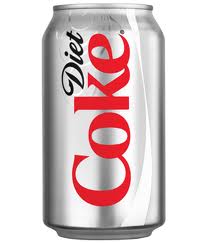I used to be an avid Diet Coke drinker. I drank it regularly often patting myself on the back for finding a zero-calorie ‘healthier’ soda. (I could get my caffeine fix AND not gain weight! I was yards ahead of those Regular Coke drinkers!) Soon, however, I noticed I was hooked. If I did not have my Diet Coke at lunch I got antsy. In a short time, I grew dependent on my soda. When I noticed, I started consciously cutting back.
Now, I do not drink any soda at all (minus my special-beloved Root Beer once every 3 months). As I do more and more research, I find that my Diet Soda may not be as ‘healthy’ as I led myself to believe. Here’s a great article that highlights a study that suggests that Diet Sodas may actually be WORSE for you than Regular Soda. What do you think?
Click here for the original article.
It’s every dieter’s worse nightmare: The food or drink they thought would help their efforts may instead be contributing to their weight challenges. For diet soda drinkers, new research suggests that this nightmare is, in fact, a reality.
Two new studies found that drinking diet soda is associated with increased waist size and poorer overall health. Both studies were conducted by teams of researchers at the University of Texas Health Center at San Antonio and presented earlier this summer at the American Diabetes Association’s Scientific Sessions meeting in San Diego, Calif.
The first study analyzed nearly 10 years worth of data collected from 474 subjects participating in the San Antonio Longitudinal Study of Aging. Individuals who reported drinking at least two diet sodas per day experienced waist-size increases that were six times greater than those who didn’t drink diet sodas. The fact that they gained weight around the middle is significant because abdominal fat has been associated with increased risk for heart disease, diabetes and other chronic conditions.
But the bad news doesn’t stop there: The second study concluded that aspartame—the artificial sweetener most commonly used in diet sodas—raised blood-sugar levels in mice that were prone to diabetes. After three months of eating chow laced with aspartame, the mice had much higher blood-sugar levels than the mice that ate the plain chow.
“These results suggest that heavy aspartame exposure might potentially directly contribute to increased blood-glucose levels,” said lead researcher Dr. Gabriel Fernandes, a professor of rheumatology and clinical immunology at the university, “and thus contribute to the associations observed between diet soda consumption and the risk of diabetes in humans.”
Dr. Helen P. Hazuda, lead researcher of the first study and a professor at the university’s school of medicine, believes that these studies suggest that artificial sweeteners, which have been promoted as healthy alternatives to caloric sweeteners, may not be entirely harmless. “They may be free of calories,” said Hazuda, “but not of consequences.”




Speak Your Mind